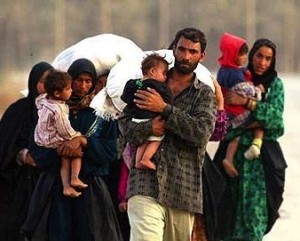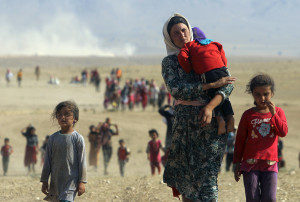2015 – The year of the refugee
The number of people forced to flee war or conflict will top 60 million before the end of 2015, the United Nations refugee agency has said, creating the worst refugee crisis in history.
One in every 122 people on Earth has been forced to flee their home; a ratio worse even than at the end of WWII.

One in every 122 people on Earth has been forced to flee their home
At least five million people were forcibly displaced from their homes in the first half of the year, adding to the 59.5 million displaced people the United Nations High Commission for Refugees (UNHCR) had recorded by the end of 2014.
Most of the people on the move in 2015 were displaced within their own country, but as many 839,000 people fled across international borders in the first half of the year, more than a third of them trying to escape the war in Syria.
“Never has there been a greater need for tolerance, compassion and solidarity with people who have lost everything,” UN High Commissioner for Refugees António Guterres said as the UNHCR released a new report on displaced people.
“Forced displacement is now profoundly affecting our times. It touches the lives of millions of our fellow human beings – both those forced to flee and those who provide them with shelter and protection,” Mr Guterres, the departing High Commissioner, said.
And funds available to help the increasing number of people fleeing conflict had fallen far behind the level of need, Mr Guterres said.
“It’s clear humanitarian factors are no longer able to provide the minimum support both in relation to core protection and lifesaving activities,” he said.
Also, fewer refugees were able to return to their own country. Only 124,000 refugees returned home in 2014, down from a million a decade ago, the report said.
The UNHCR reported that the number of returning citizens dropped an additional 20 per cent in the first half of this year.
It said that someone becoming a refugee today had a lower chance of going home than at any time in more than 30 years.
In absolute terms, and counting refugees who fall under UNHCR’s mandate, Turkey is the world’s biggest host country with 1.84 million refugees as of 30 June.
Lebanon hosts more refugees compared to population size than any other – 209 refugees per 1,000 and Ethiopia pays most in relation to its economy with 469 refugees for every dollar of gross domestic product.
Overall, the lion’s share of hosting refugees continues to be carried by countries immediately bordering zones of conflict, many of them in the developing world, the report said.

At least 5 million people were forcibly displaced from their homes in the first half of 2015
The agency’s assessment came as the International Organization for Migration said the number of refugees and migrants crossing the Mediterranean to Europe would likely exceed a million arrivals for the year in a matter of days.
By last week total boat arrivals had reached 956,456, more than 80 percent of them landing in Greece.
Europe’s influx of people arriving by boat via the Mediterranean is only partly reflected in the report, mainly since arrivals escalated in the second half of 2015. Still, in the first six months, Germany was the world’s biggest recipient of new asylum claims – 159,000, close to the entire total for all of 2014.
The second largest recipient was Russia with 100,000 claims, mainly people fleeing the conflict in Ukraine.
Laurie Nowell
AMES Australia Senior Journalist












